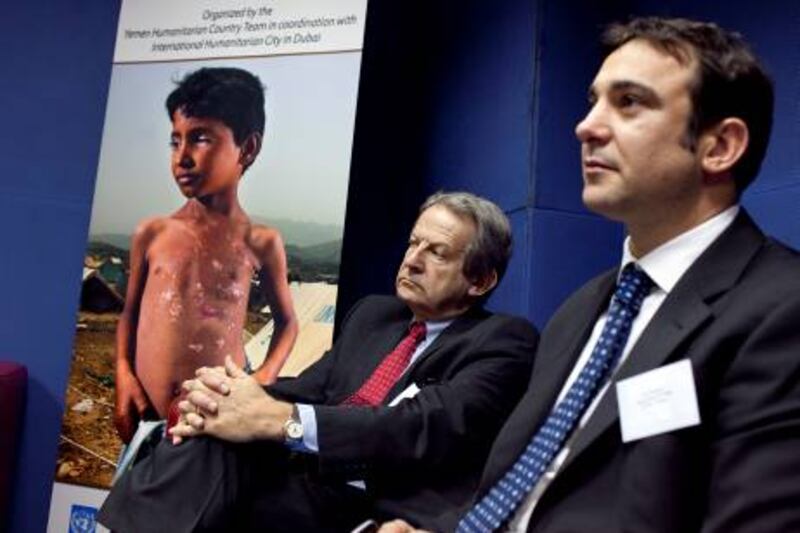DUBAI // Yemen will need almost $500 million in aid to avert a humanitarian crisis on the scale of the starvation and drought that ravaged the Horn of Africa this year, aid agencies warned yesterday.
Representatives from United Nations agencies said about seven million people in Yemen are in need of food, of whom three million are already in dire need, and 60 per cent of the country's 12 million children were malnourished.
"While there have been significant political developments in Yemen, humanitarian needs are expected to deteriorate still further over the next 12 months," said Jens Toyberg-Frandzen, the UN Humanitarian Coordinator for Yemen. He said the country's nutrition figures were comparable to those of Somalia.
The Yemen Humanitarian Response Plan 2012 was launched in Dubai Humanitarian City yesterday, a week after a transitional government took control in Yemen and promised stability.
The interim government was sworn into office on December 10 as part of a GCC-brokered deal that paves the way for the formal departure of the long-serving president, Ali Abdullah Saleh.
But the UNDP says the conflict and political instability have already set the country back by almost 10 years.
"It is in the Gulf countries' interest that there be stability in Yemen," said Mr Toyberg-Frandzen. "We are expecting support from all over the world, and certainly from the Gulf countries."
Dr Ahmed Al Anansi, the Yemeni health minister, said yesterday: "There is a positive spirit in the country after political reconciliation. All these proposed interventions really represent the volume of the problems and crises we are facing in Yemen in the past few months. Humanitarian support will play a crucial role in this period of transition."
The appeal for $447m (Dh1.64 billion) in 2012 represents a 95 per cent increase on the international aid received by the country this year.
Dr Al Anansi said his government's priority was to rebuild damaged hospitals and revive the economy. He said his country was "expecting a lot" from the UAE and the rest of the world to restore normality.
In 2009, Yemen was the biggest recipient of UAE aid, with more than Dh2.8bn. In 2010, it received Dh276m.
Dr Al Anasi urged all countries to donate generously. "The Yemeni people deserve attention," he said.
Geert Cappelaere, representative of the United Nations Children's Fund in Yemen, said more than 2.5 million children had been prevented from going to school this year, because their schools had either been occupied by militia or bombed.
"Gulf countries have been extremely generous to the crisis in the Horn of Africa and to help the children of Somalia," he said. It was important for countries to come forward to support Yemeni children in the same manner.
Aid workers said other areas that will require international assistance include health care, sanitation and clean water. The influx of refugees from the Horn of Africa, particularly Somalia, is only exacerbating the crisis. More than a million refugees are believed to have crossed into Yemen.
Oxfam Great Britain will launch its cash transfer programme next month to offer immediate help. The organisation will give 15,000 families $25 a month for the next three months to buy food.
Rising food and fuel prices were forcing women to resort to begging, the NGO said.
"Yemen is the poorest country in the Middle East," said Kelly Gilbride, policy adviser for Oxfam's Yemen office. "And people are exhausting their coping mechanisms."
UAE to host meeting
The UAE will host the United Nations’ annual global donations appeal next month, it was announced yesterday.
The Consolidated Appeal Process is a joint effort by international aid organisations, including several UN agencies, to push for assistance to meet the world’s major humanitarian challenges in a strategic and effective way.
Expected to be the largest appeal for aid in decades, the 2012 event will seek to raise more than US$7.7 billion to assist 51 million people in 16 countries affected by conflict, poverty, disease and natural disasters.
This is the second time the UAE will host the announcement: in November 2009, a UN call to raise $7b for 30 million people in 31 countries was made here, too. It was the first time in several years the event was launched in a city other than Geneva or New York.
Next month’s event follows a similar call by Valerie Amos, UN Under Secretary-General for Humanitarian Affairs, in Geneva earlier this week.
“The UAE will be hosting a launch parallel to the one in Geneva this year,” said Abeer Etefam, a spokesman and senior regional public information officer for the World Food Programme.
She said sh hoped the event would encourage regional governments to commit to assisting and also increase awareness of pressing needs.
* Preeti Kannan






